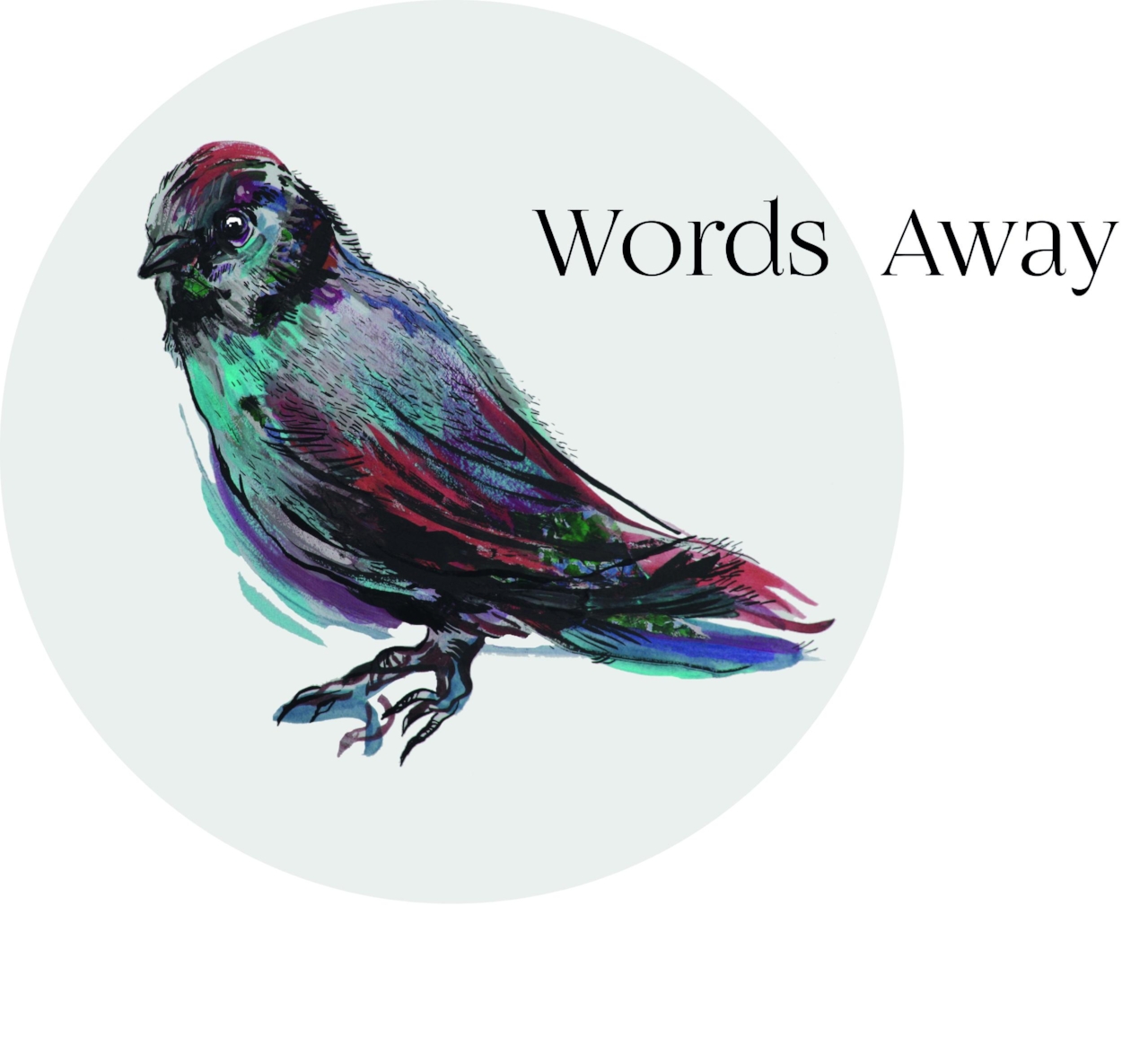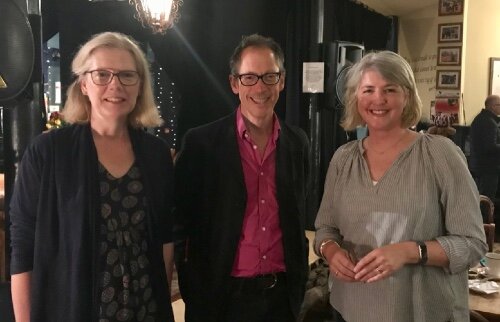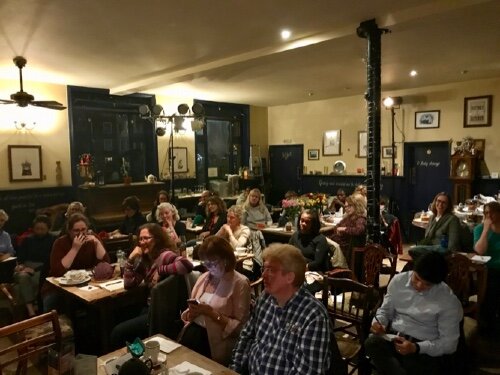We welcomed editor and publisher Richard Beswick, the Managing Director of Little Brown/Abacus, to Words Away last month. Richard spoke with humour and candour about the different stages a book might go through before making it into the bookshops. He flagged up the difficulty of predicting trends but put his bet on climate change as the next big thing. Producing a book in a competitive market is beset with risks and commercial pressures - if any of us had high hopes for our unpublished manuscripts they may have been somewhat dampened after listening to the realities of the industry. Fortunately it wasn’t all bad news, and we were much encouraged by Richard’s palpable enthusiasm for books and his work. For Richard a good book is defined by well-drawn characters and compelling story-telling. He spoke about about the pleasure of “small victories” as well as surprise hits and the excitement of discovering a book that can’t be pigeon holed.
L-R: With co-chair Emma Darwin and Richard Beswick
Following university Richard found his way into publishing via bookselling. He began his editing career at Penguin in the 1980’s when the publishing landscape was very different. He’s been at Little, Brown for many years and witnessed great change in the industry. Abacus is the paperback imprint for Little, Brown books and has an impressive roster of award-winning, bestselling fiction authors, including Donna Tartt; Celeste Ng; Alexander McCall Smith; Beryl Bainbridge; Anita Shreve and Chigozie Obioma among many others. Little, Brown/Abacus also has a hugely successful non-fiction list, with authors including Nelson Mandela’s Long Walk to Freedom; David Sedaris; Walter Isaacson’s biography of Steve Jobs; and the Fire and Fury by Michael Wolff.
We asked how the Richard’s dual roles as an editor and publisher work or overlap. He likened a publisher to a garage owner and the editor to a mechanic fiddling under the bonnet. An editor takes many shapes and forms, from the copy editor (who deals with consistency and punctuation etc) to commissioning editors who’ll be looking out for books to acquire. Emma suggested that an editor is someone who helps you write the book you’d already thought you’d written. Throughout the process the editor is the writer’s main point of contact. There will be decisions to be made, be it about the length of the book - is it too long, not long enough or too thin - or are the characters working? For more detailed information see the links below.
As a publisher, Richard might decide what the title will be, what the jacket might look like or the time of year the book will be published. He wouldn’t try and publish a debut novel in September, for example, or “you’ll be competing with the big names like a Margaret Atwood or an Ian McEwen.” As a publisher in a largish company you’re also competing internally with a lot of your colleagues for space and the attention of the one person selling to Waterstones. You want to ensure that you're not publishing four debuts novels or several biographies of the Mitford's in the space of one month!
Lots of note taking!
Publishing anything is a risk, “no one knows anything”! Books can take off unexpectedly, like Long Walk to Freedom, Nelson Mandela’s autobiography, first published in 1994 by the American arm of Little, Brown. It was a surprisingly big hit, said Richard. He stressed the importance of publicity in selling books. National media coverage, especially newspaper reviews, is vital to the success of the kinds of books that Abacus publish. He pointed to the buzz surrounding Sally Rooney’s books, published by Faber and Faber, "making everyone think something’s going on here, I need to find out what it’s about.”
We heard about the current publishing landscape and how the industry is dominated by two or three big publishing houses that house smaller companies or imprints. These include the French owned Hachette, (home of the Little, Brown group including the imprints Abacus and Virago amongst others), the German owned, Penguin and the American publishing group, Harper Collins. He added that while other smaller companies contribute interesting variety to the culture, one of the challenges facing the industry is that there are only two key places to sell books; Amazon (like or loathe them they are an integral part of the industry) and Waterstones. Richard mentioned that there while there are excellent independent bookshops providing a fantastic service, from a publisher’s perspective if he wants to sell a lot of books then it’s down to Amazon and Waterstones.
The audience had a bundle of interesting questions for Richard
Perhaps the life of a jobbing writer has never been an easy one. Richard recommended reading New Grub Street by George Gissing, about the the trials and tribulations of a working writer in Victorian London. On the up side, writers today arguably have as a good a chance as ever to get published, setting financial reward aside which can be difficult. There’s a variety of small publishers, like Salt and Galley Beggar Press, that take a risk on original voices and publish books that go on to win attention and critical acclaim like Ducks Newburyport by Lucy Ellmann.
The conversation roamed far and wide over the publishing and editing terrain, peppered with insight, hard truths and insider information, some of which we promised not to repeat. You had to be there! With special thanks to Richard for a fabulously entertaining discussion.
Our final salon of the year is tonight, Monday 2nd December, at The Teahouse Theatre when we’ll be meeting Aiysha Malik to chat Writing Humour in Fiction. Seeing it’s the season of goodwill I’m going to be running a raffle with some lovely book bundle prizes in support of the wonderful letter writing charity, From Me To You - so please raid your money box and bring some cash.
I’m taking a break over Christmas and the new year. Words Away will be back with a cracking new program of salons and masterclasses beginning in February 2020. We have some brilliant guests and creative writing teachers lined up including our favourites Emma Darwin and Andrew Wille. More information to follow and booking to open online shortly. Do sign up for the mailing list if you’d like to receive prior notice!
Hope to see you soon.
Kellie
References and links:
Definitions of Editing: key terms - Andrew Wille, Being Published: This Itch of Writing - Emma Darwin
little, brown Book Group, Waterstones, Ducks Newburyport by Lucy Ellmann, Galley Beggar Press, Salt Publishing, Long Walk to Freedom by Nelson Mandela, Sally Rooney, Fire and Fury: Inside the Trump White House by Michael Wolff, Milkman by Anna Burns, Bloody Foreigners by Robert Winder, Charles Dickens, Donna Tartt, New Grub Street by George Gissing
Post salon chat.




